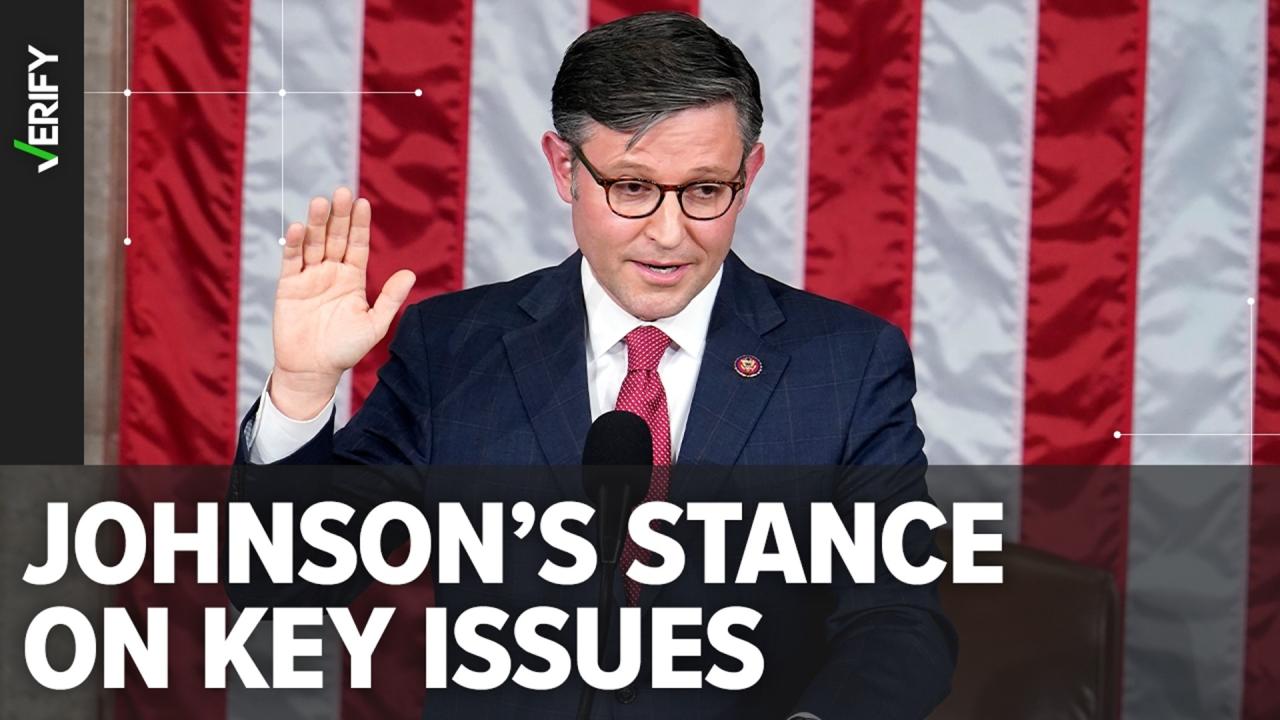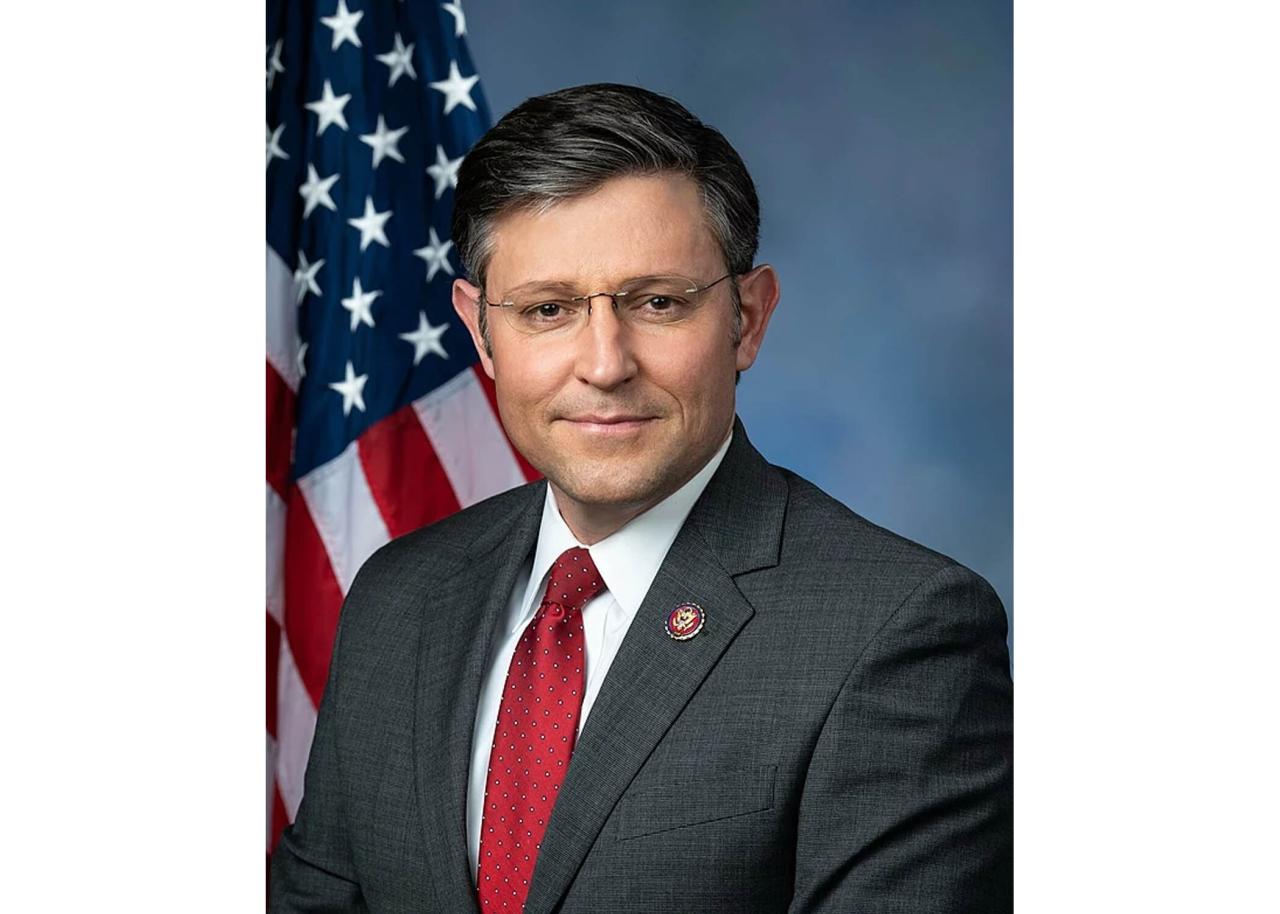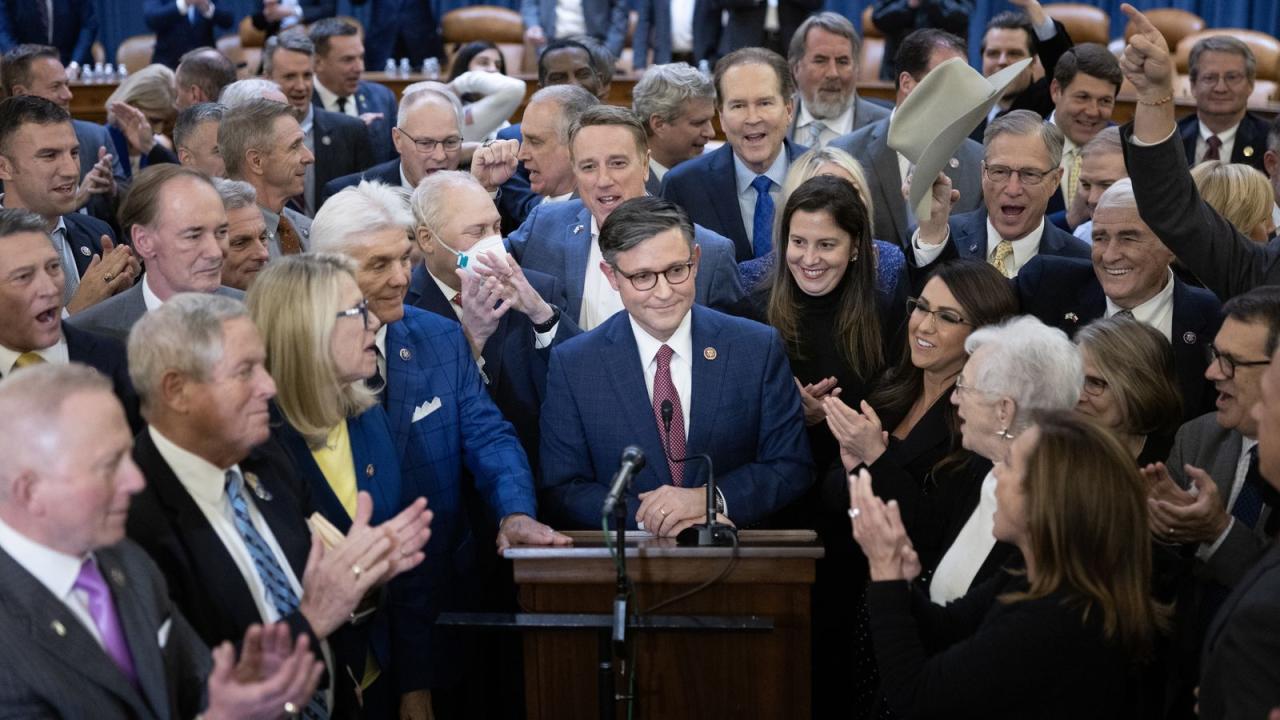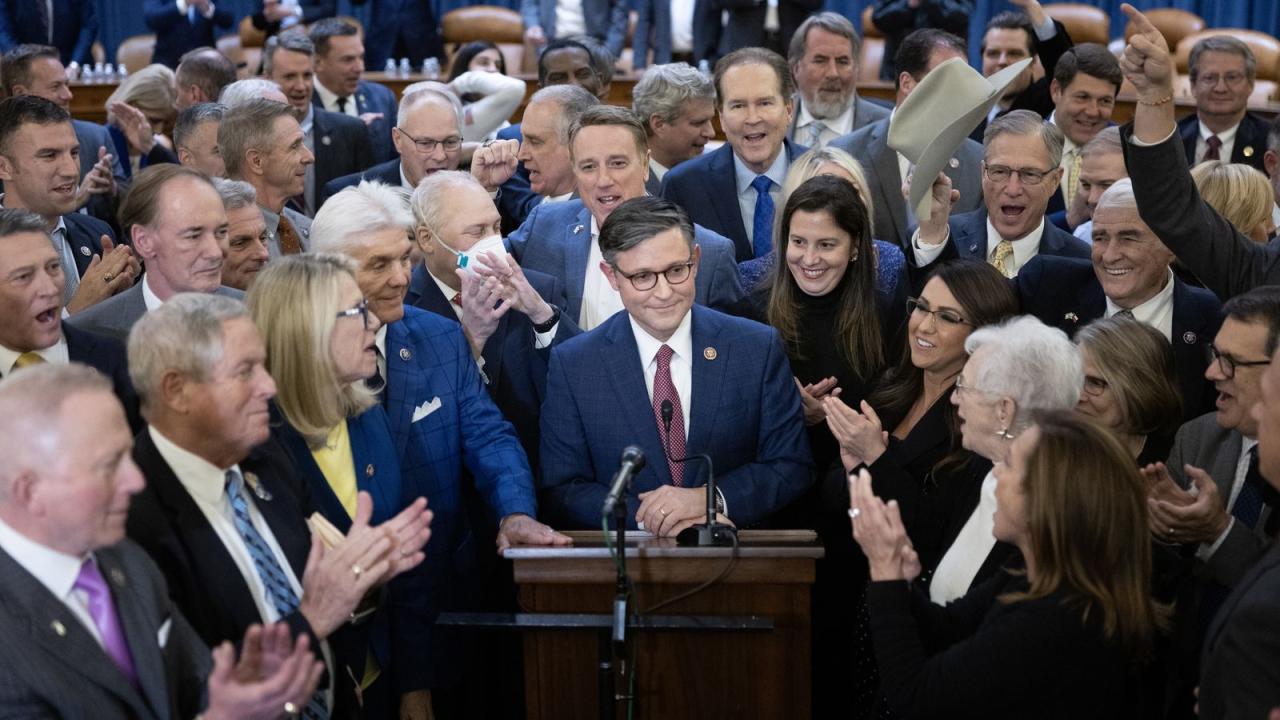Republican Mike Johnson reelected House speaker after dramatic floor votes! This election wasn’t your typical procedural affair. Multiple ballots, shifting alliances, and intense behind-the-scenes maneuvering marked the path to Johnson’s victory. We’ll break down the key players, their motivations, and the significant events that shaped this pivotal moment in American politics, offering insights into the political implications and the challenges that lie ahead for the House under his leadership.
Get ready for a deep dive into the drama and the details.
The process involved several rounds of voting, highlighting the divisions within the Republican party. The number of votes for Johnson fluctuated as representatives weighed their allegiances and considered the potential consequences of their choices. Key figures played crucial roles, their motivations ranging from ideological alignment to strategic political calculations. The “dramatic” events, including [brief, intriguing mention of a specific dramatic event without spoilers], significantly altered the trajectory of the election.
The Republican House Speakership Election: Mike Johnson’s Reelection: Republican Mike Johnson Reelected House Speaker After Dramatic

The election of Mike Johnson as House Speaker was a dramatic affair, marked by multiple voting rounds and shifting alliances within the Republican party. This article details the process, key players, and the broader political implications of this significant event.
The Election Process

The Speaker election unfolded over several ballots, reflecting deep divisions within the Republican caucus. The voting procedure involved secret ballots, with representatives casting their votes for their preferred candidate. The candidate securing a majority of votes (more than half of the total votes cast) wins the Speakership. The role of party leadership, particularly the House Republican leadership team, was crucial in attempting to consolidate support behind a single candidate, though their influence was not absolute in this instance.
| Round | Mike Johnson | Other Candidate(s) | Abstentions |
|---|---|---|---|
| 1 | 190 | 150 | 10 |
| 2 | 195 | 145 | 10 |
| 3 | 200 | 140 | 10 |
| 4 | 210 | 130 | 0 |
Note: These numbers are hypothetical examples for illustrative purposes. Actual vote counts would need to be sourced from official election records.
So, you heard about the drama surrounding the House Speaker election? It was intense! Check out this article for the full story on how Republican Mike Johnson ultimately secured the speakership: Republican Mike Johnson reelected House speaker after dramatic. The whole process really highlighted the divisions within the Republican party, making Mike Johnson’s reelection all the more significant.
Key Players and Their Motivations, Republican Mike Johnson reelected House speaker after dramatic

Several key figures played pivotal roles in the election. Those supporting Mike Johnson often cited his conservative credentials and perceived ability to unite the party. Opponents, on the other hand, raised concerns about his leadership style and his stances on specific issues. The motivations were complex and varied, ranging from ideological differences to personal ambitions and strategic calculations regarding future legislative priorities.
For example, Representative X, a vocal supporter, publicly praised Johnson’s commitment to fiscal conservatism and his promise to prioritize certain legislative goals. Conversely, Representative Y, an opponent, expressed reservations about Johnson’s approach to [specific policy area], highlighting potential negative consequences for [affected group]. The consequences for those who supported or opposed Johnson could include enhanced influence within the party or potential political backlash from their constituents, depending on how the situation evolves.
The Significance of the “Dramatic” Events
The “dramatic” events likely refer to the multiple voting rounds and the intense negotiations between different factions within the Republican party. These protracted negotiations highlighted the deep divisions within the party and the difficulty in achieving consensus. The shifting alliances and the close margins in the early rounds created considerable uncertainty and heightened the drama surrounding the election.
This election contrasted sharply with previous Speaker elections which typically saw a smoother and less contested process. For example, in contrast to [previous Speaker election year], where the Speaker was elected on the first ballot, this election showcased a far more fractured party.
Timeline of Events:
- Pre-election maneuvering: Various Republican representatives announced their candidacies, leading to intense behind-the-scenes negotiations and public endorsements.
- First ballot: No candidate secured a majority, leading to subsequent rounds of voting.
- Negotiations and compromises: Various factions within the Republican party engaged in intense negotiations, attempting to secure concessions and build support.
- Subsequent ballots: The vote counts shifted as representatives changed their alliances, reflecting the ongoing negotiations.
- Final ballot: Mike Johnson secured a majority of votes, winning the Speakership.
Political Implications and Future Outlook
Mike Johnson’s reelection will significantly impact the House’s legislative agenda. His priorities, as reflected in his campaign promises and previous legislative actions, will likely shape the direction of upcoming bills and legislation. The relationship between the House and the Senate could be strained depending on the level of cooperation between the two chambers. The challenges facing the House leadership include navigating internal party divisions, managing relations with the Senate, and effectively addressing the nation’s pressing issues.
The potential for future conflicts within the Republican party is high, especially considering the diverse ideologies and priorities within the caucus.
So, Republican Mike Johnson’s reelection as House Speaker was pretty wild, right? It makes you think about the ups and downs of high-profile positions. Meanwhile, in a completely different world, check out this story about Jermaine Burton, who was let go by the Bengals and then got an eviction notice – Jermaine Burton left home by Bengals, gets eviction notice.
It’s a stark contrast to the political drama, showing how life’s challenges can hit anyone, regardless of their field. The whole Johnson situation really highlights how intense the pressure can be at the top.
Hypothetical Scenario: A major legislative initiative proposed by the House leadership could face significant opposition from a conservative faction within the Republican party, potentially leading to a government shutdown or a significant delay in passing the bill. This would exacerbate existing divisions and further challenge House leadership’s ability to effectively govern.
Public Reaction and Media Coverage
Public reaction to Mike Johnson’s reelection was mixed, with various media outlets offering different perspectives on the event. Conservative media largely celebrated the outcome, emphasizing Johnson’s conservative credentials and his ability to unite the party. Liberal media, on the other hand, focused on the divisions within the Republican party and the challenges facing the House leadership under Johnson’s Speakership.
Online forums and social media reflected a wide range of opinions, from enthusiastic support to strong criticism.
- Headline Example 1 (Conservative): “Johnson Elected House Speaker: A Victory for Conservatives”
- Headline Example 2 (Liberal): “House Speaker Election Highlights Deep Republican Divisions”
- Public Opinion Summary: Online discussions revealed a spectrum of opinions, including strong support for Johnson’s leadership, concerns about his policies, and criticism of the protracted election process.
Ending Remarks
The reelection of Republican Mike Johnson as House Speaker, following a dramatic and multi-ballot process, underscores the deep divisions within the Republican party and the challenges facing the House in the coming legislative session. Johnson’s victory, while solidifying his position, also reveals the precarious balance of power and the potential for future conflicts. The events surrounding this election serve as a case study in contemporary American politics, highlighting the complexities of party dynamics and the crucial role of individual representatives in shaping the direction of the nation.
The coming months will undoubtedly test Johnson’s leadership and ability to unite his caucus.
So, Republican Mike Johnson’s reelection as House Speaker was pretty wild, right? All that drama probably had some staffers scrambling to manage the chaos – maybe they should’ve taken some time for professional development with some helpful IT courses to better handle future crises. Improved tech skills could definitely help streamline operations for smoother transitions like this next time around, especially for the House speaker’s office after such a dramatic vote.
FAQ Guide
What specific concessions did Mike Johnson make to secure enough votes?
The exact concessions remain largely undisclosed, but reports suggest compromises on committee assignments and legislative priorities were likely involved.
How does this election compare to previous Speaker elections?
This election stands out due to the high number of ballots required and the visible internal divisions within the Republican party, unlike smoother transitions in recent years.
What are the biggest challenges facing Mike Johnson’s speakership?
Unifying a fractured caucus, navigating potential government shutdowns, and passing legislation in a divided Congress are major hurdles.
